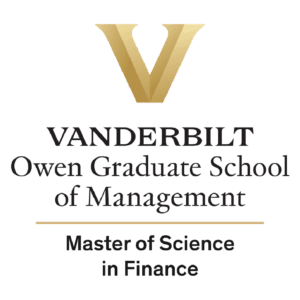The Vanderbilt University Master in Finance degree just wrapped up their class of 2012 and I am lucky enough to have a brand new review of the program. It’s comprehensive and recent so hopefully it provides some much needed perspective for anyone considering the program.
——-
1) Why an MSF in general? Why Vanderbilt in particular?
Having a year of work experience, I had to choose between an MBA and an MSF. In my opinion the MSF was the better precursor to a job in technical finance. The ability to take only classes that were strictly applicable to my future career was a huge plus. When considering an MBA, you must be willing to take classes covering all spectrums of business, and I believe most undergraduate institutions cover these other topics pretty well. Lastly, it is my belief more technical and specialty masters programs will become more desirable than an MBA in the near future.
I chose Vanderbilt over a few other schools for 3 big reasons.
- The Vanderbilt name seemed to carry more weight than many other programs and schools. To expand, it seemed like other popular programs had great names, but those names were only worthwhile if attempting to stay in that particular region. I thought Vanderbilt was a great choice when looking at the East Coast, Midwest, West Coast, and the South.
- The Owen faculty is one of the best in the country. Bob Whaley is the father of the VIX, Hans Stoll developed Put Call Parity, Jacob Sagi has new instruments out based on the VIX, Craig Lewis is a big shot at the SEC.
- Being intertwined with the MBA’s is a huge advantage. The ability to network daily with students from a top 25 (or 26?) MBA caught my attention. Everywhere you find info on the Master in Finance you hear network network network, and spending time with the MBA’s seemed like a good gateway into that world.
2) Who would you recommend an MSF to?
I would recommend an MSF to someone who is absolutely sure they want to go into finance, and is immediately starting upon graduation from undergrad or has less than 2 years of work experience. I will say having over a year of experience before starting at Vanderbilt was a big advantage in interviews, networking, and overall confidence.
3) Pros and Cons (if any) of the Vanderbilt program
Pros
- Finance Faculty is one of the best in the nation
- Ability to network/become friends with MBA’s is a huge advantage when networking
- Ability to design the second half of your curriculum allowed people who had obtained jobs to take classes that were specifically applicable to their new role
- The program director, Kate Barraclough, and MSF Career Services Rep, Blake Gore, are two of the most dedicated and worthwhile people at Vandy
- Great student group, a lot of fun yet they pushed me to work hard
- 9 months was just a touch short
- The yearly New York trip wasn’t big enough for all MSF’s to go
4) Anything else. Feel free to talk about OCR, campus experience, any activities or competitions you took part in during the year, networking, etc. As much or as little as you want.
I was pleasantly surprised by on campus recruiting. Overall a lot more firms came considering MSF’s than I had ever really imagined. Sometimes you compete against undergrads, sometime you compete against MBA’s, and sometimes they just want MSF’s. Vanderbilt’s MSF has a huge strength in it’s Career Management Center. They continually have workshop’s and sessions (specifically designed for a MSF’s situation) available concerning networking, resume writing, intro letters etc. The CMC is also very dedicated and really worked hard to help find us interviews and job opportunities.
I want to note how much fun the program was. They have kegs in the lobby every Thursday night, and often have other events prepared with free food, drink, and networking. The city of Nashville and Vanderbilt Campus is a blast, and we had plenty of opportunity to get over to the Honky Tonks & Vandy bars.
—————————————————————————————————————————————————————-
Here is a link to the Vanderbilt University Masters in Finance program



